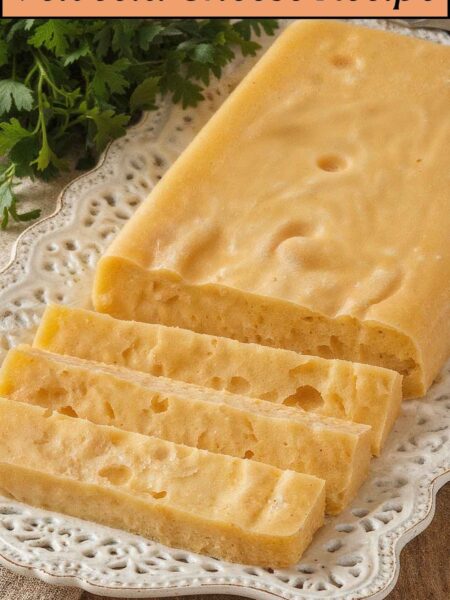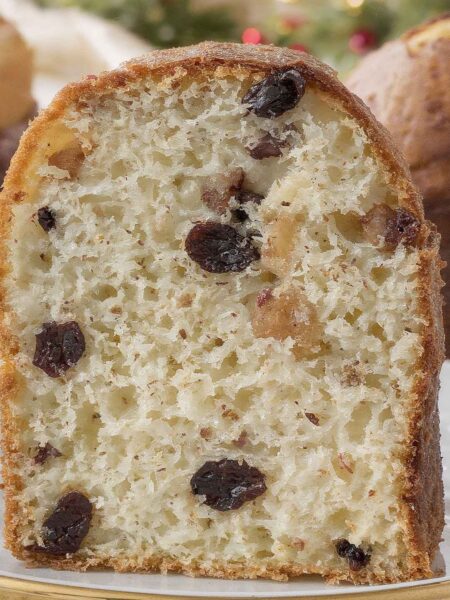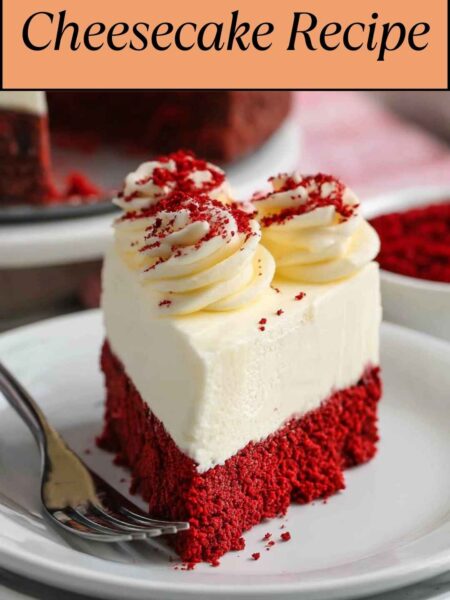Before diving into old-fashioned bread and butter pickles, let’s talk about what you can serve alongside them. These pickles shine in many settings.
Imagine a summer barbecue—grilled burgers and hot dogs are delicious, but add a jar of homemade bread and butter pickles, and you’ve taken them to the next level. They provide a crispy, tangy contrast that captures everyone’s attention.
Serve them with sandwiches, particularly ham or turkey. The sweetness of the pickles cuts through the savory meat beautifully. You can also pile them onto a charcuterie board alongside cheese, olives, and nuts for a snack that’s aesthetically pleasing and tasty.
Trust me when I say, they also pair well with a summer salad or as a topping on a picnic spread. Got a picnic planned? Don’t forget to pack your pickles!
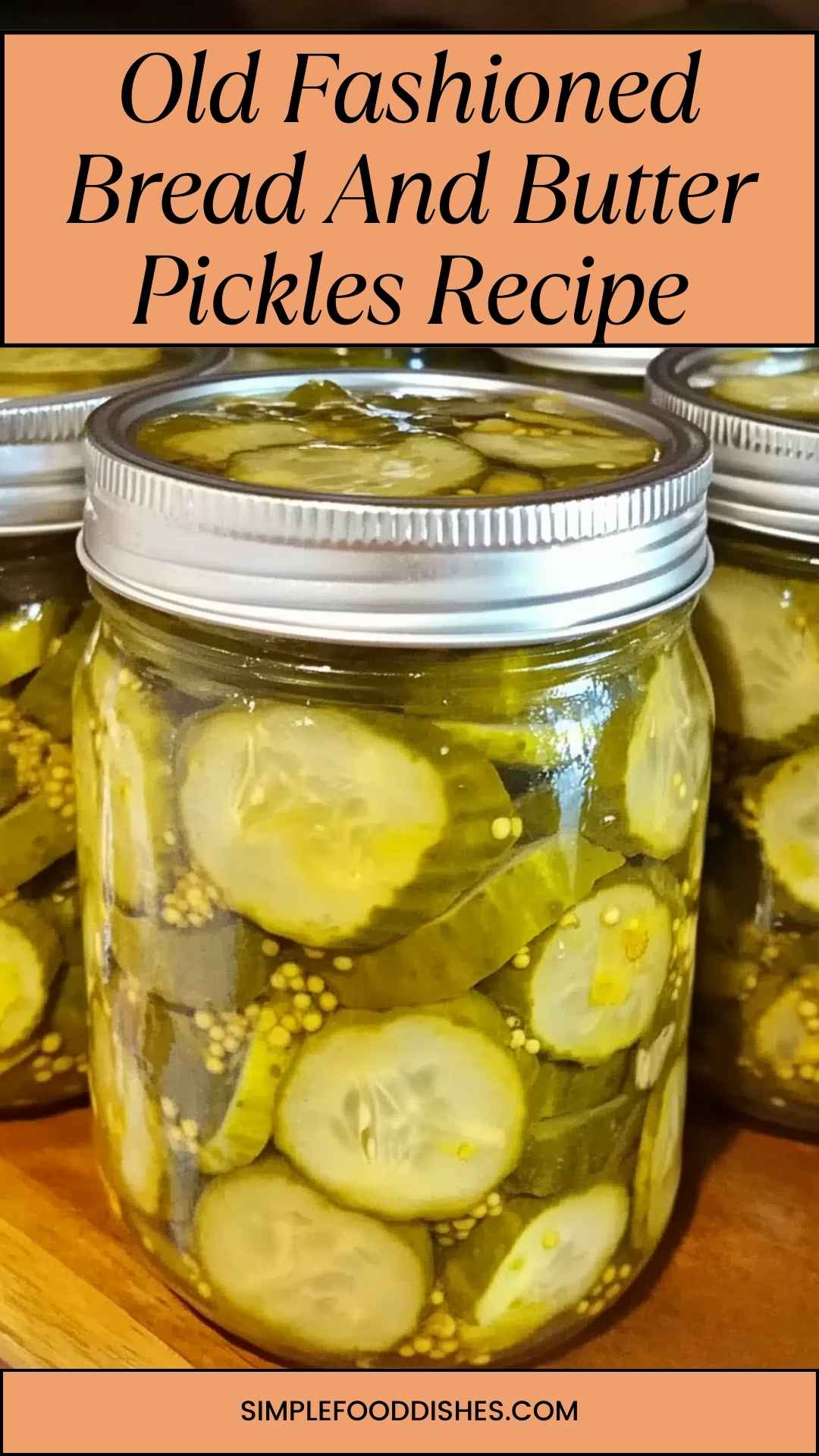
What are Old Fashioned Bread and Butter Pickles?
Old-fashioned bread and butter pickles are sweet, tangy pickles made from sliced cucumbers and onions, preserved in a flavored vinegar solution.
The name supposedly originated during the Great Depression, where families often traded pickles for bread and butter. The combination was simple yet satisfying.
The sweetness comes from sugars, often brown sugar, which creates a delightful balance with the vinegar’s acidity.
They can add zest to sandwiches, serve as a snack, or accompany rich, hearty dishes. These pickles join the ranks of beloved classics, making them a staple for many.
How Does It Taste?
The flavor profile of old-fashioned bread and butter pickles is a delightful harmony. You experience a crunch from the cucumbers, which is wonderfully complemented by the sweetness of sugar.
A tangy note from vinegar adds brightness, while the spices infuse layers of depth. When tasted, you get a delightful mix of sweet, sour, and slightly spicy flavors.
If you enjoy a pickle that isn’t overly sour, these are for you. They offer a comforting embrace of flavor without overwhelming your palate, making them accessible to pickled cucumber lovers and newcomers alike.
Why You’ll Love This Recipe
There are countless reasons to love old-fashioned bread and butter pickles.
1. Simplicity: The ingredient list is straightforward. You can pronounce every item!
2. Versatile: Use these pickles in sandwiches, salads, or simply enjoy them straight from the jar.
3. Economical: Making pickles at home is far cheaper than buying gourmet jars at the store.
4. Customization: You can adjust the sweetness and spices to suit your preference.
5. Food Preservation: Making pickles is an excellent way to preserve your cucumbers and reduce food waste.
Ingredients
Let’s gather our ingredients to get started on this delightful journey:
- 1 cup light brown sugar
- 3 pounds small pickling cucumbers
- 1/4 cup kosher salt (for pickling)
- 1 pound white onions, thinly sliced
- 1/2 teaspoon black peppercorns
- 2 quarts of crushed ice (or ice cubes, then water)
- 3 cups apple cider vinegar (5% acidity, or substitute with white vinegar)
- 1 teaspoon dried dill weed
- 1 tablespoon yellow mustard seed
- 1 teaspoon celery seed
- 1 teaspoon ground turmeric
- 1/2 teaspoon crushed red pepper flakes
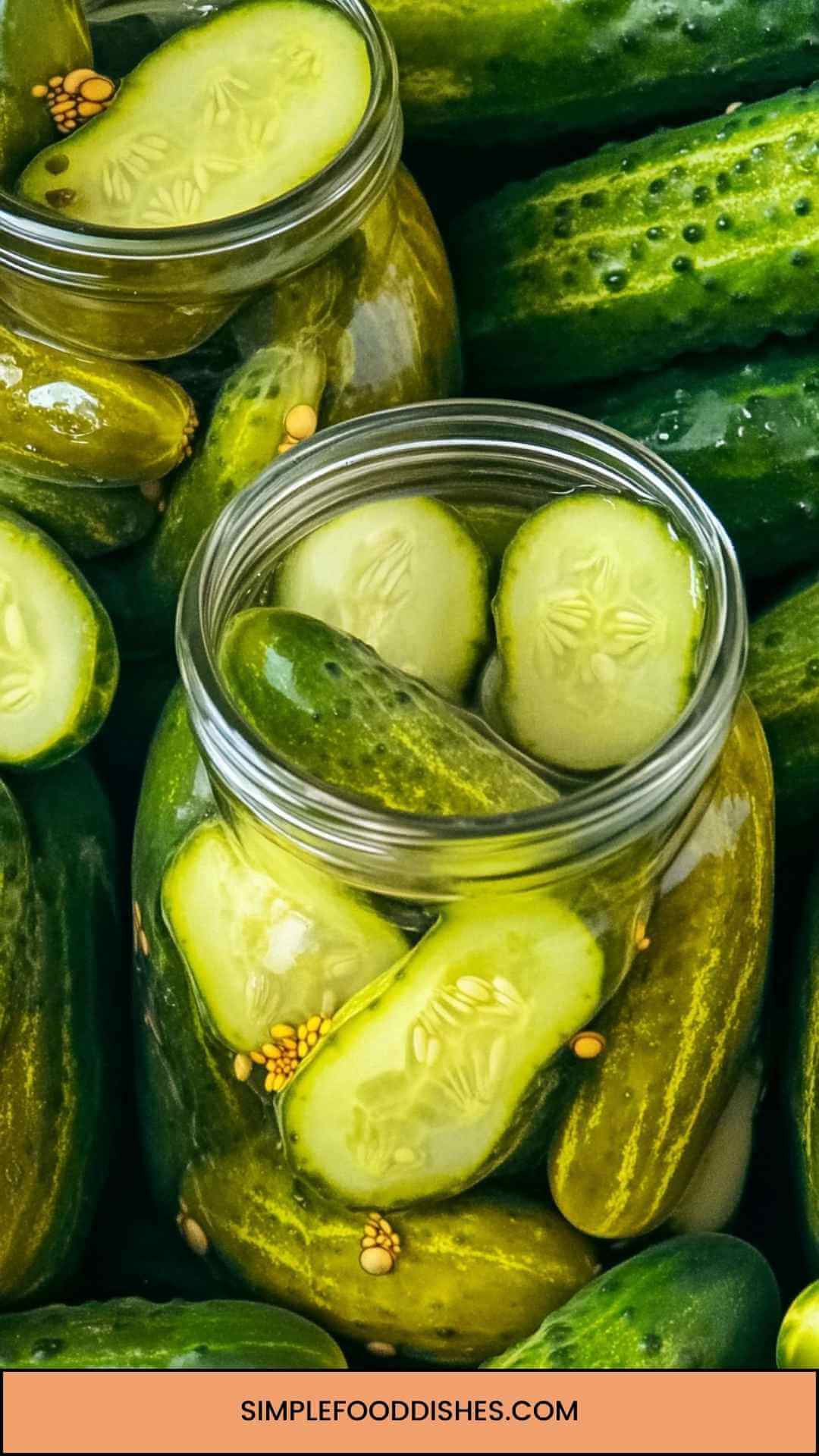
Step-by-Step Directions
Now, it’s time to roll up our sleeves and get into the nitty-gritty of making these delightful pickles.
Step 1: Prepare the Cucumbers
Start by washing your pickling cucumbers under cool running water. Trim off the ends, then slice them into thin rounds. Aim for about 1/4 inch thickness. This size ensures they soak up the brine while maintaining a delightful crunch.
Step 2: Brine the Cucumbers
In a large bowl, combine the sliced cucumbers and onions. Sprinkle them with 1/4 cup of kosher salt. Toss the mixture to ensure the salt evenly coats the vegetables. Let it sit for about two hours. This process draws out excess moisture and helps your pickles stay crispy.
Step 3: Rinse and Drain
Once the cucumbers and onions have soaked, rinse them thoroughly under cold water. This step removes excess salt, which can overpower your pickles. Drain them well and set aside.
Step 4: Prepare the Brine
In a large saucepan, combine apple cider vinegar, brown sugar, peppercorns, dill weed, mustard seed, celery seed, turmeric, and crushed red pepper flakes.
Heat the mixture over medium heat, stirring until the sugar fully dissolves. Bring it to a gentle boil, then remove it from heat.
Step 5: Pack the Jars
Sterilize your jars by boiling them for 10 minutes in water. Once ready, pack your cucumbers and onions tightly into the jars, leaving about half an inch of headspace.
Pour the hot brine over the cucumbers, ensuring they are fully submerged.
Step 6: Seal and Process the Jars
Wipe down the rims of the jars to remove any residue. Place the lids on, tightening them until just snug. If you’re canning, process the jars in a boiling water bath for 10 minutes.
Allow them to cool completely before storing them in a cool, dark place.
Tips on Making Old Fashioned Bread and Butter Pickles
Here are some handy tips for perfect pickling:
- Use Fresh Cucumbers: For the best flavor and crunch, always opt for fresh pickling cucumbers.
- Adjust Sweetness: Feel free to tweak the sugar in the brine to match your taste.
- Experiment with Spices: Don’t hesitate to add other spices like garlic or bay leaves for an extra kick.
- Let Them Rest: Allow the pickles to sit for at least 24 hours after canning to let the flavors meld and develop.
- Try Other Onions: You can use red or sweet onions if you prefer a milder flavor.
How Do You Store Old Fashioned Bread and Butter Pickles?
Proper storage is crucial for keeping your pickles delicious and safe to eat. Here’s how:
- Refrigerator: If you don’t can them, store your pickles in a sealed jar in the refrigerator. They’ll last for about 1-2 months.
- Canned: For properly canned pickles, store them in a dark, cool place. They can last up to a year if processed correctly.
- Check Seals: Always check the seals before consuming. If a lid pops or is dented, discard the jar.
What Other Substitutes Can You Use in Old Fashioned Bread and Butter Pickles?
If you want to experiment or adjust, here are some suggestions:
- Sweetener Alternatives: Honey or maple syrup can replace brown sugar for a natural sweetness.
- Different Vinegars: White vinegar, red wine vinegar, or rice vinegar can create unique flavor profiles.
- Herb Variants: Fresh dill or tarragon can offer a fresher taste compared to dried herbs.
- Spicy Kick: Jalapeños or habaneros can be added for those craving heat!
- Zucchini: For a twist, use this vegetable beside or in place of cucumbers.
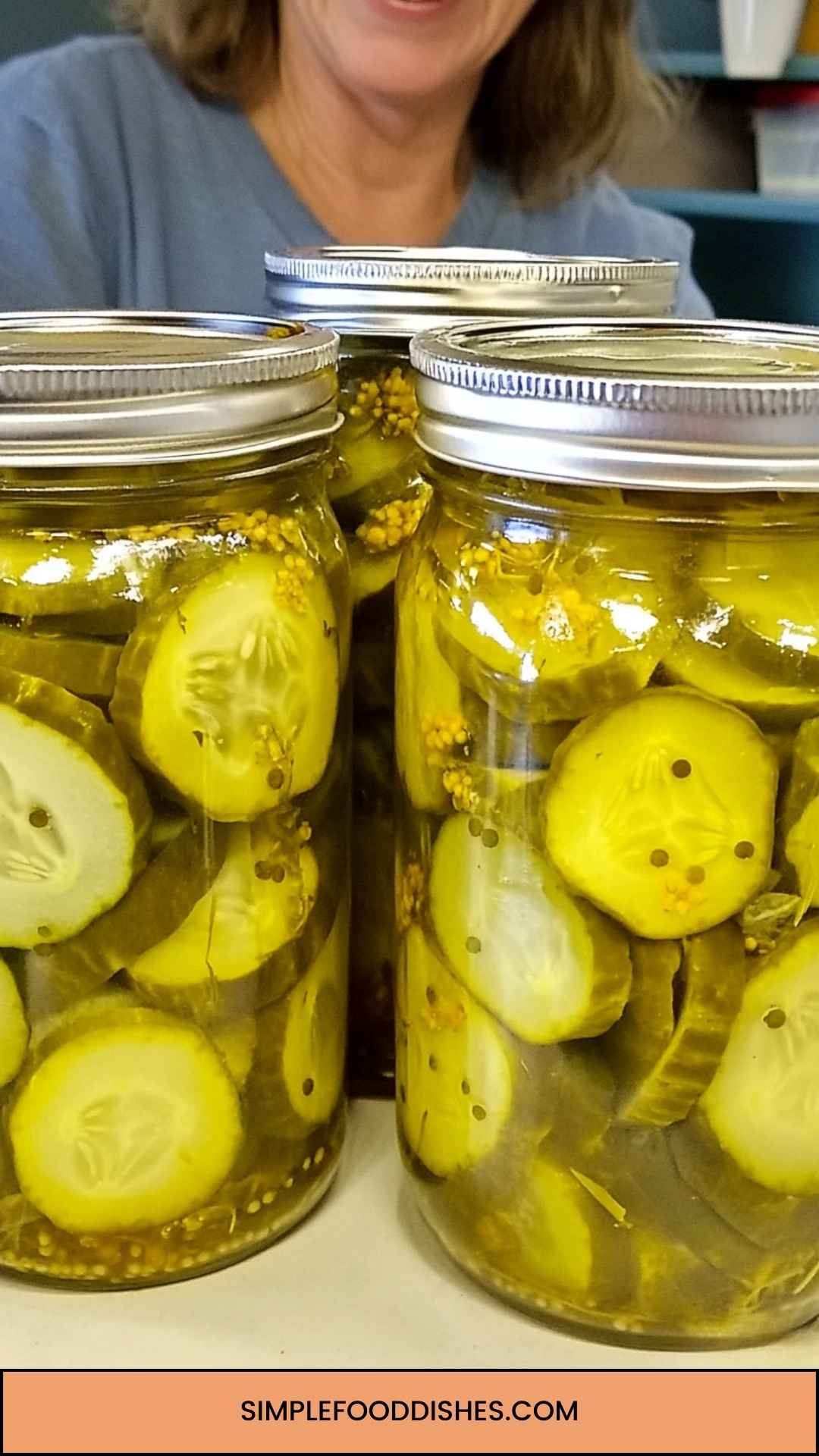
Conclusion
Old-fashioned bread and butter pickles are simple, satisfying, and absolutely delicious. Whether you’re enjoying them straight from the jar, in a sandwich, or served alongside a barbecued feast, the flavors are irresistible.
By making them at home, you retain control over the ingredients, turning a classic recipe into a personal favorite. It might remind you of childhood memories or inspire new traditions in your family.
So, roll up your sleeves and gather your ingredients. Get ready for a delightful culinary experience that’s rewarding, tasty, and downright fun. Rediscover the joy of pickling and enjoy these treasures all year round!
Happy pickling!
You’ll also like the following recipes!
- Simple Dutch Apple Pie Copycat Recipe
- How to Make Easy Mini No Bake Key Lime Pie
- Best Homemade Baileys Irish Cream Recipe
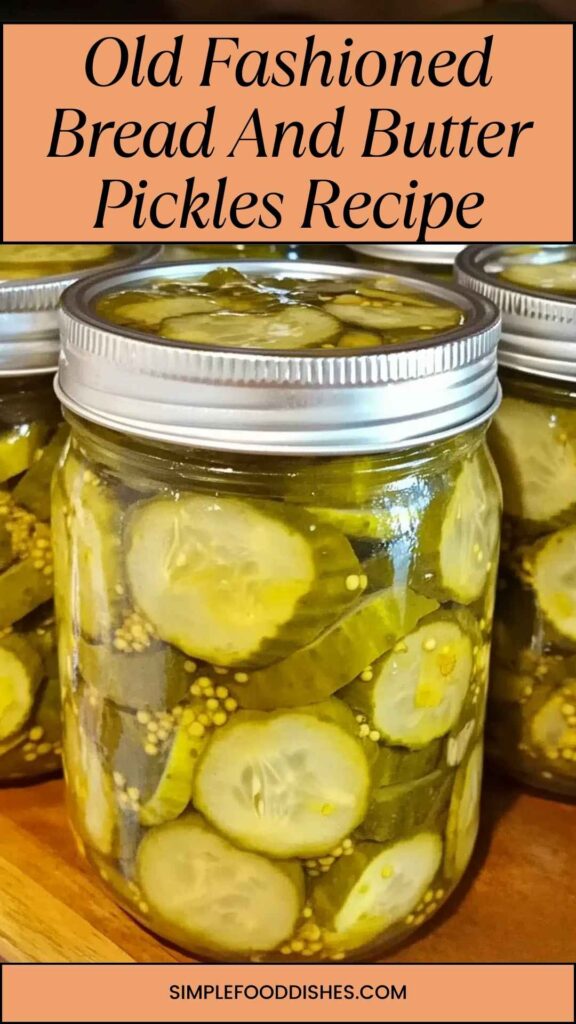
Old Fashioned Bread And Butter Pickles Recipe – Simple Food Dishes
Description
As a food enthusiast and registered dietitian, I have always found joy in simple, homemade recipes. There’s something uniquely satisfying about taking fresh ingredients and turning them into sweet, crunchy treasures.
Old-fashioned bread and butter pickles hold a special place in my heart. They remind me of summer afternoons spent at my grandmother’s kitchen table, surrounded by laughter, love, and the scent of vinegar bubbling on the stove.
These pickles offer the perfect blend of sweetness and tanginess. They are a testament to the age-old tradition of preserving produce, extending shelf life and flavor long past the harvest.
With a few simple ingredients, you can whip up a batch that not only complements your meals but also brings warmth and nostalgia to your dining experiences.
In this blog post, I will take you through everything you need to know about old-fashioned bread and butter pickles. From the flavors they bring to the table to the step-by-step process of making them, let’s embark on this culinary journey together.
Ingredients
Instructions
Step 1: Prepare the Cucumbers
-
Start by washing your pickling cucumbers under cool running water. Trim off the ends, then slice them into thin rounds. Aim for about 1/4 inch thickness. This size ensures they soak up the brine while maintaining a delightful crunch.
Step 2: Brine the Cucumbers
-
In a large bowl, combine the sliced cucumbers and onions. Sprinkle them with 1/4 cup of kosher salt. Toss the mixture to ensure the salt evenly coats the vegetables. Let it sit for about two hours. This process draws out excess moisture and helps your pickles stay crispy.
Step 3: Rinse and Drain
-
Once the cucumbers and onions have soaked, rinse them thoroughly under cold water. This step removes excess salt, which can overpower your pickles. Drain them well and set aside.
Step 4: Prepare the Brine
-
In a large saucepan, combine apple cider vinegar, brown sugar, peppercorns, dill weed, mustard seed, celery seed, turmeric, and crushed red pepper flakes.
Heat the mixture over medium heat, stirring until the sugar fully dissolves. Bring it to a gentle boil, then remove it from heat.
Step 5: Pack the Jars
-
Sterilize your jars by boiling them for 10 minutes in water. Once ready, pack your cucumbers and onions tightly into the jars, leaving about half an inch of headspace.
Pour the hot brine over the cucumbers, ensuring they are fully submerged.
Step 6: Seal and Process the Jars
-
Wipe down the rims of the jars to remove any residue. Place the lids on, tightening them until just snug. If you’re canning, process the jars in a boiling water bath for 10 minutes.
Allow them to cool completely before storing them in a cool, dark place.
Nutrition Facts
Servings 80
- Amount Per Serving
- Calories 3kcal
- % Daily Value *
- Total Fat 0.1g1%
- Sodium 28297mg1180%
- Total Carbohydrate 1g1%
* Percent Daily Values are based on a 2,000 calorie diet. Your daily value may be higher or lower depending on your calorie needs.
Note
- Use Fresh Cucumbers: For the best flavor and crunch, always opt for fresh pickling cucumbers.
- Adjust Sweetness: Feel free to tweak the sugar in the brine to match your taste.
- Experiment with Spices: Don't hesitate to add other spices like garlic or bay leaves for an extra kick.
- Let Them Rest: Allow the pickles to sit for at least 24 hours after canning to let the flavors meld and develop.
- Try Other Onions: You can use red or sweet onions if you prefer a milder flavor.



